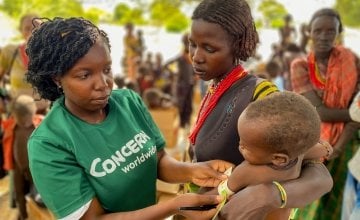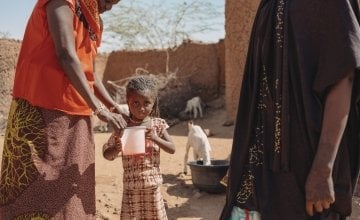
Read our 2023 annual report

Knowledge Hub
Just over 20 years ago, a simple series of innovations revolutionised how severely malnourished children were treated. Concern CEO Dominic MacSorley reflects on the important anniversary, while stating a lot more needs to be done.
It all begin when Concern, in partnership with Valid International, tested a new community based model that empowered mothers to treat their own children at home, thus radically shifting away from the need for traditional in-patient clinical feeding centres, which were expensive and often very far away.
From the initial pilot in a number of villages in northern Ethiopia this approach, which became known as Community-based Management of Acute Malnutrition (CMAM) went on to be adopted globally by UNICEF, WHO, NGOs and national governments.
Funded initially by Irish Aid, CMAM remains one of the most transformational developments in nutrition that has saved the lives of millions of children in some of the harshest environments in the world. For Concern, an organisation rooted in Ireland- a country with its own experience of hunger and famine- this has a particularly strong resonance.
However, the story of reducing hunger since then has not been linear, and is certainly far from triumphant. In 2016, for the first time since 2000, global hunger started to rise and has been rising ever since, driven by conflict, climate-related disasters and now COVID-19.

A world in need
Take Yemen, over six years of brutal conflict have left up to 400,000 of Yemen’s children facing starvation right now. The same situation faces millions of people in South Sudan, where conflict has led to the highest levels of food insecurity since the country became independent 10 years ago. In Syria, which has just passed the tragic milestone of a decade of war, the food security situation has never been worse- inflation has spiked, with food prices rising 230% in the past year, an additional 4.5 million people are without enough to eat as a result.
But conflict alone is not the only driver. We need only look at the largest ever plague of locusts that swept across Africa to see how climate change is intensifying crises, devastating farming communities and wiping out livelihoods overnight. Added to this hunger around the world is accelerating at rates not seen in decades, as a result of COVID-19 disruptions to markets with food price spikes occurring simultaneously in many of the world’s most fragile economies.
Against this cataclysmic backdrop, many donor nations are turning increasingly inward. Earlier this month, a fundraising conference organised by the UN to avert famine in Yemen fell drastically short of its targets as donor nations shied away from helping those facing catastrophe.
The UK was singled out for particular criticism after slashing its aid to the country by 60% from last year, especially as it is now one of the only remaining nations providing weapons to the conflict after the US suspended arms sales earlier this year.
As one of the most critical existing donors to humanitarian programmes, the imminent cuts to UK overseas assistance are poised to have a particularly destructive effect, but the UK is not alone. While trillions has been shored up in domestic responses to the COVID crisis, less than half of the $9.5 billion dollars needed to respond to the humanitarian effects of COVID has been pledged. When you consider this alongside the choice of western governments not to commit to ensuring equitable access to vaccines across the world, it is clear that, at a time of extreme global need, the most vulnerable are being left behind.
An opportunity to reflect

Despite all that humanitarian assistance is achieving, and its extraordinary impact, it is falling short. The combination of new and unprecedented levels of need and the inadequate levels of humanitarian funding has put us on course for great tragic and avoidable loss of life in 2021.
This is inexcusable. No one should die because of a lack of money or will.
Twenty years ago we really thought we were on the road to putting hunger and starvation behind us. Although real progress has been made since then, that progress has been stifled, not only by conflict and climate change but also by a lack of urgency and resolve in responding to their human impact.
Next week, in partnership with Irish Aid, Concern is hosting a virtual conference on ‘CMAM- 20 years on’. Governments, health and medical professionals from around the world –including from South Sudan, Chad, Niger, Democratic Rep of Congo, Pakistan, Kenya, Ethiopia and Somalia will come together to reflect on the progress that has been made since then, and to provide a forum for practitioners to discuss ways to improve and scale up nutrition in fragile contexts.
As the impact of COVID-19 continues to shake our world, we must continue to adapt and invest in new ways to address hunger, and reach and treat more children.
Today, less than 25% of children who need treatment for malnutrition receive it – leaving 35 million futures in the balance. That is the challenge that lies ahead and while we are much better at treating malnutrition; we need to do better at preventing it.
The knowledge, resources and capacity exists to end global hunger by 2030, the goal set by the United Nations. However, that will not come close to happening without renewed urgency and resolve.
The decisions we are making today, or failing to make, not only have disastrous results for those most at risk right now, they will have profound effects for years to come.
Follow Concern
Follow Concern on Twitter to keep up with news and updates.
Our impact in 2023
people reached through our emergency response
people reached through our health interventions
people reached through our livelihoods programmes

Other ways to help
Corporate support
Is your company interested in working together for a common cause?
Fundraise for Concern
From mountain trekking to marathon running, cake sales to table quizzes, there are lots of ways you can support our work.
Buy a gift
With an extensive range of alternative gifts, we have something to suit everybody.
Leave a gift in your will
Leave the world a better place with a life-changing legacy.
Volunteer with Concern
The lots of ways to get involved with our work as a volunteer
School fundraising
Without the generous support from schools, we wouldn't be able to do the work that we do.

